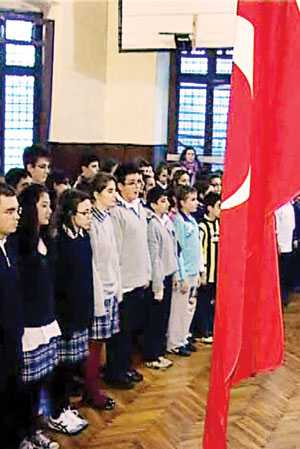ANKARA – Hürriyet Daily News
 A German musical group is demanding compensation for copyright infringement for İstiklal Marşı.
A German musical group is demanding compensation for copyright infringement for İstiklal Marşı.
The discovery that the Turkish national anthem, “İstiklal Marşı,” may be unprotected by copyright has sparked legislative efforts to make the song public property.
A proposed bylaw to do so was opened for signatures during Monday’s Council of Ministers meeting, headed by Prime Minister Recep Tayyip Erdoğan.
Turkey’s Culture Ministry is scrambling to legally protect the country’s national anthem after a German musical society demanded compensation for copyright infringement from a Turkish school in the European country that played the song.
GEMA, a society for composers, songwriters and music publishers that focuses on music licensing, had demanded the royalties from a Turkish school in Germany that played the “İstiklal Marşı” during its Turkish National Sovereignty and Children’s Day celebrations in April 2007.
When their initial objections to GEMA’s demand proved unsuccessful, school administrators contacted the Turkish Culture Ministry for help. At this point, it became clear that despite having been the Turkish national anthem for the past 89 years, “İstiklal Marşı” had never been put under legal copyright protection.
Turkey’s Law on Intellectual Property states that a work is protected for 70 years after the death of the person who created it.
The poet who penned the words to the Turkish anthem, Mehmet Akif Ersoy, died in 1936, while the score’s composer, Zeki Üngör, died in 1958. This means that if the intellectual property rights are applicable to national anthems, rights to the song would still belong to Üngör’s estate.
In order for GEMA to demand royalty payments for the song, the request would have to come from Üngör’s heirs, said lawyer Hakan Hanlı, the legal consultant for the Hürriyet Daily News & Economic Review.
“If the request came from the inheritors, than GEMA can legally demand the payments,” he said Hanlı. “If an existing law does not exist protecting the anthem, then it must be added to the Law on Intellectual Property as soon as possible.”
The lawyer added that a Council of Ministers decision would not be enough to legally protect the anthem.
Abdurrahman Çelik, the Culture Ministry’s director for copyright and cinema, told the Anatolia news agency last week that the issue should have been taken care of earlier, but had been either neglected or forgotten until now.
“If foreigners ask us to whom the national anthem belongs, nobody would understand us if we said that it is ‘our national anthem,’” Çelik said. “The main point of the proposed bylaw is to define the rights to it, so no one can illegitimately demand royalties.”